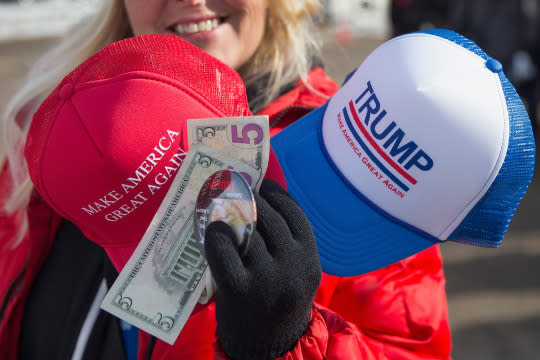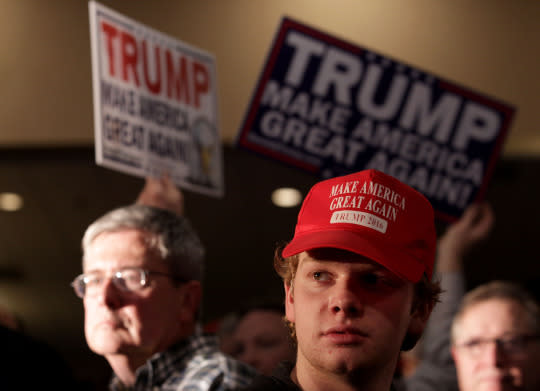Trump Gear Is Causing Giggles and Threats

A vendor sells merchandise outside a rally for Republican presidential candidate Donald Trump in Dubuque, Iowa, on Jan. 29. (Photo: Getty Images)
To show her support for Donald Trump, Brianna Algazali secured a sticker to her laptop with the candidate’s name in big, bold letters. Sitting in class at St. John’s University in New York, the 20-year-old was threatened on social media when a classmate surreptitiously took a picture of her. “7000 retweets and i’ll smash this b***h’s computer,” Clifford Durand, 18, wrote. The image received a ton of attention (it was retweeted more than 16,000 times), and after the incident, Algazali admitted, “I fear for my safety.”
Luke Thorburn, a financial adviser for Goldman Sachs, faced similar backlash: He was placed on administrative leave after a New York Times story revealed that he’d invested in a company that makes Trump apparel.
More than in any other election, fashion has played a major part for both Democrats and Republicans. Sartorial presentations of support — whether they’re big (such as Tom Brady having a Trump hat in the New England Patriots locker room or Anna Wintour sitting front row at New York Fashion Week in a Hillary Clinton tee) or small (your neighbor, cousin, or co-worker sporting politically themed attire) — really matter. The presidential conventions are around the corner, tensions are high, and fashion has gotten caught in the crossfire. Seemingly inconsequential statements on hats or T-shirts are prompting disproportionate reactions.
While “Feel the Bern” and “Yaaas Hillary” shirts exist and may occasionally cause dustups, nothing has been more polarizing — or made a bigger impact — than Trump merchandise. This might simply be because there’s so much of it. In total, the real estate magnate has invested about $1.8 million in paraphernalia, including T-shirts, buttons, and hats adorned with the entrepreneur’s slogan, “Make America Great Again.”
Because of the strained political climate, though, some owners of these items — most featuring “MAGA,” an acronym for “Make American Great Again” — don’t feel confident sporting them. For example, one voter who lives and works in a liberal area often considers wearing his red Trump hat to his tech job but checks himself before stepping into the office.
Part of the hesitation to express his leanings stems directly from the fact that his supervisor is a big Clinton fan. “I don’t see any upside with getting on her bad side,” he said of his boss. “So I just go to work and bottle in my emotions.” But, he added, he hopes Trump wins “so I can walk into work the day after the election with my Trump cap on and be honest. That would be a good day.” Another devotee at a tech firm on the East Coast wore a red “MAGA” cap just one time and was met with co-workers referring to him and his Trump allies as “stupid retards, Nazis, traitors, or whatever.”
Per Title VII of the Civil Rights Act of 1964, employers cannot discriminate based on race, color, sex, religion, and national origin. Yet, according to Julie Zerbo of The Fashion Law, a popular blog dedicated to the intersection of fashion and law, this doesn’t apply to politics. Technically, a Trump hat could be banned if it’s against a company’s dress code. “In addition to potentially causing turmoil between employees, such visible demonstrations of party affiliation may not be acceptable at businesses where there is contact with the public or where the company otherwise sees itself as needing to show political neutrality. And, so, employers can bar it for that reason,” she explained. In 2004, Lynne Gobbell of Alabama was fired for having a John Kerry/John Edwards bumper sticker on her car, because her boss was a Bush supporter.
Even at universities, some Trump supporters are hesitant to wear the candidate’s tees or hats. One 19-year-old who attends a university in Wisconsin owns a lot of “MAGA” stuff but chooses to wear it only in his dorm room to avoid being “harassed, excluded, and even discriminated against,” he said. Even without wearing his political preference on his sleeve, he’s often met with combatant rhetoric such as, “Trump is an idiot,” “Trump is a racist,” and “Only idiots support Trump.”
One night, he discussed the possibility of wearing his “Make America Great Again” hat on a date with his girlfriend, a Trump fan who attends school in Illinois and is often presented with similar issues, but they decided against it. “I do not think that we would be physically harmed over a “Make America Great Again” hat, but people have done crazier things before,” he said. “The biggest reason we decided against it was because it isn’t worth the problems it would most certainly cause.”
Some Trump supporters, on the other hand, enjoy the comments they get while wearing their political gear. A 17-year-old from a liberal metro area enjoys wearing her Trump stuff because of all the hate she gets. She’s been yelled at or simply been given silent dirty looks. “But it’s also a conversation starter,” she said. “People who don’t know the real Trump are always curious, and I’m happy to clear up misunderstandings and spread the truth.”

A young man wearing a “Make America Great Again” hat at Trump’s election night watch party in New Hampshire. (Photo: Getty Images)
Oddly enough, even though many “MAGA” merch owners are often too intimidated to wardrobe themselves in it (excluding the aforementioned firebrand and those like her), there’s another group of consumers — those who don’t take the Trump campaign seriously — scooping it up strictly for its kitschy style. These individuals can be seen in “MAGA” hats on the streets of Brooklyn, at frat houses in Ann Arbor, Mich., or on the slopes in Vermont. To them, the clothing isn’t telling others who they want in the White House come 2016; it says, “How hilarious is it that the guy from The Apprentice is running for president?” It’s a fashion statement, not a political one.
In July, before it was even imaginable that Trump would be considered the frontrunner for the GOP nomination, the kind of guys you might see in finance firms and Hamptons timeshares went to the lobby of Trump Towers in Midtown Manhattan to pay $20 for retro-style baseball hats in red, navy blue, or white with “Make America Great Again” written on them.
“I got it when it just came out,” one 20-something who works in real estate in New York said. Whenever he wore it that summer, people loved it and found it to be funny — he did too.
Even now, when it’s clear that Trump isn’t running as a joke and he has a strong field of followers, dudes who have no intention of casting their ballots for him are wearing his apparel. In February in Vermont, just weeks before Trump swept Super Tuesday, one guy in a Trump hat, which he wore backward in a bar, said “of course” he was wearing it as a joke. A whole squad of current fraternity brothers at the University of Wisconsin-Madison echoed this sentiment. “Aren’t they hilarious?” one chuckled as the rest of the group slapped him on the backside in agreement.
Whether someone is too scared to wear a “Make America Great Again” hat in public or is appropriating the item ironically, it’s clear that Trump merchandise is loaded with meaning beyond simply being a billboard for the candidate. But with the general election still months away, it remains to be seen how the pieces will play out on an even bigger stage — with even higher stakes.
Follow us on Facebook, Instagram, and Pinterest for nonstop inspiration delivered fresh to your feed, every day.
